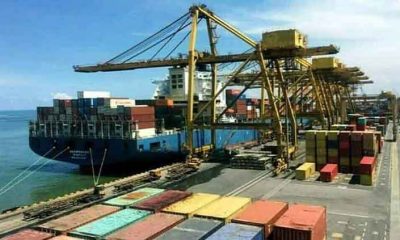Business
Argentina seals 20 billion-dollar IMF deal, tears down currency controls

Argentina sealed a $20 billion, 48-month Extended Fund Facility deal with the International Monetary Fund on Friday and, in a major policy move ahead of the deal, dismantled key parts of its years-long currency controls and loosened its grip on the peso.
The IMF will disburse $12 billion by next Tuesday, while another $2 billion will become available by June.
The deal is expected to help Argentina “catalyze additional official multilateral and bilateral support, and a timely re-access to international capital markets,” the IMF said.
“Key pillars of the program include maintaining a strong fiscal anchor, transitioning towards a more robust monetary and FX regime, with greater exchange rate flexibility,” it added in a statement.
Earlier, the South American nation’s central bank announced it would undo a fixed currency peg from Monday, letting the peso freely fluctuate within a moving band between 1,000 and 1,400 pesos per dollar, versus 1,074 at the close on Friday.
Argentina will eliminate major parts of the so-called “cepo” capital controls that have restricted access to foreign currency, the central bank said in a statement.
Companies, from this year, will also be able to repatriate profits out of the country, a key demand from businesses that could unlock more investment.
“As of Monday, we will be able to put an end to the foreign exchange restrictions which were imposed in 2019 and which limit the normal functioning of the economy,” Economy Ministry Luis Caputo said at a press conference.
Libertarian President Javier Milei addressed the nation in a televised speech on Friday night and stated that Argentina was “in a better position than ever to withstand external turbulences.”
However, an IMF staff report on the $20 billion deal warned that “downside risks remain elevated,” as program implementation could be challenged by rising global trade tensions and, domestically, by the volatility added by the upcoming electoral cycle and fragile social conditions.
‘THIS IS A DEVALUATION’
The new exchange rate system could allow the peso to weaken almost a third if the currency were to hit the weaker edge of the band, although the central bank is likely to have some tools to intervene. The band will expand 1% each month, the bank said.
The policy move came ahead of the final IMF nod for what is the 23rd program in a long and mottled history between the grains-producing nation and the Washington-based lender.
Funds from the IMF deal will be used to recapitalize Argentina’s central bank and the government expects they will help usher in a healthier currency, reduce inflation and allow for tax cuts, Caputo said.
Other multi-year disbursements were also announced, including $12 billion from the World Bank and $10 billion from the Inter-American Development Bank.
Argentina needs the financial firepower to bolster depleted foreign currency reserves that are in the red on a net basis and have been falling in recent weeks, amid sticky inflation and a country risk index that has started to rise again.
The funds are also key to unlocking the currency controls, which will likely prompt a period of local market volatility already stirred up by the international tariff war between the United States and its trade partners.
“This is a devaluation, which rather goes against what the government would have intended to calmly get to elections,” said economist Ricardo Delgado, referring to midterm legislative elections later in the year.
“It’s a bit surprising that at this time of global volatility, the controls are being lifted,” he added.
Business
Wall Street poised to add to last week’s gains when markets open Monday

Wall Street was poised to add to last week’s gains when markets open on Monday as investors juggle incoming corporate earnings along with possible tariff updates from the U.S. and its trading partners.
Futures for the S&P 500 gained 1.4% before the bell Monday, while futures for the Dow Jones Industrial Average rose 1%. Nasdaq futures were up 1.7%.
Shares rose in technology companies that stood to be hit hardest by the U.S. tariffs against China after President Donald Trump said he was temporarily exempting smartphones, computers and other electronics from the import fees.
Apple jumped close to 6% in premarket trading Monday, with computer maker Dell and chipmaker Super Micro Computer also up by about the same amount.
Goldman Sachs rose 1.5% after the New York investment bank topped Wall Street’s first-quarter earnings and revenue targets.
Coming later this week are the latest financial results from Bank of America, United Airlines and Netflix, among others.
The Chinese Ministry of Commerce said Trump’s weekend tariffs move was “a small step” toward fixing its wrongful action of what the U.S. president calls reciprocal tariffs. China urged him to completely cancel them.
China had announced Friday that it was boosting its tariffs on U.S. products to 125% in the latest tit-for-tat increase following Trump’s escalations on imports from China.
Hong Kong’s Hang Seng jumped 2.4% to 21,417.40, while the Shanghai Composite index picked up 0.8% to 3,262.81 after the government reported that China’s exports surged 12.4% in March from a year earlier in a last-minute flurry of activity as companies rushed to beat increases in U.S. tariffs imposed by Trump.
The Taiex fell 0.1% in Taiwan, whose economy is heavily dependent on exports of computer chips and other high-tech goods after Trump said the new chip tariffs will be announced “over the next week.”
The friction between the world’s two largest economies could cause widespread damage and a possible global recession, even after Trump recently announced a 90-day pause on some of his tariffs for other countries, except for China.
In early European trading, Germany’s DAX gained 2.4%, the CAC 40 in Paris was up 2.1% and Britain’s FTSE 100 added 1.7%.
Asian shares logged sturdy gains. Japan’s Nikkei 225 rose 1.2% to 33,982.36 and South Korea’s Kospi gained 1% to 2,455.89.
Shares in technology companies surged, with Tokyo Electron up 1.4% and Advantest, a testing equipment maker, up 4.9%. South Korea’s biggest company, Samsung Electronics, gained 1.8%.
Australia’s S&P/ASX 200 added 1.3%, closing at 7,748.60.
On Friday, the S&P 500 rose 1.8%, capping a chaotic and historic week. The Dow gained 1.6% and the Nasdaq composite jumped 2.1%. For the week, they each logged gains between 5% and 7%.
Stocks kicked higher as pressure eased a bit from within the U.S. bond market, which was flashing serious warning signals last week that drew Trump’s attention.
The yield on the 10-year Treasury eased to 4.44% early Monday. On Friday, it topped 4.58% in the morning, up from 4.01% a week ago. That’s a major move for a market that typically measures things in hundredths of a percentage point.
U.S. benchmark crude oil reversed early losses, gaining 83 cents to $62.33 per barrel. Brent crude, the international standard, climbed 81 cents to $65.57 per barrel.
The U.S. dollar dropped to 143.06 Japanese yen from 143.91 yen. The euro climbed to $1.1404 from $1.1320.
Business
Thailand says to discuss tariffs with United States on April 21

Thailand’s finance and commerce ministers will lead a delegation to the United States to meet Trump administration officials and push for relief from planned heavy tariffs, a government spokesperson said on Monday.
An advance team led by Finance Minister Pichai Chunhavajira will travel to the United States on Thursday for meetings with private sector groups, with Commerce Minister Pichai Naripthaphan to join later, spokesperson Jirayu Houngsub said.
The Thai delegation expects to meet with US government representatives on Monday, April 21, he said.
Thailand is facing a 36% tariff under US President Donald Trump’s trade measures, and is hoping to use a 90-day pause on the levies to prepare a response.
The United States was Thailand’s largest export market last year with shipments of $55 billion. Washington has put its bilateral trade deficit with Thailand at $45.6 billion.
Thailand’s strategy will focus on industries where the US and Thailand share interests, such as pet food, opening markets, and increasing US imports, Jirayu said.
He also said there would be stricter inspections on Thai exports to ensure other countries were not using Thailand to circumvent US taxes.
Thai officials have previously said they would increase US imports, cut tariffs on corn and increase joint investments in the United States.
Business
China’s exports jump 12.4% in March as bigger US tariff hikes loom

China’s exports jumped 12.4% in March from a year earlier in a last-minute flurry of activity as companies rushed to beat increases in U.S. tariffs imposed by U.S. President Donald Trump, and analysts forecast sharp setbacks ahead.
Imports fell 4.3% to $211.3 billion in March, the customs administration reported, far exceeded by exports worth $313.9 billion, leaving a trade surplus of $102.6 billion.
“But shipments are set to drop back over the coming months and quarters,” Julian Evans-Pritchard of Capital Economics said in a report. “We think it could be years before Chinese exports regain current levels.”
China’s trade surplus surged to a record $992.2 billion in 2024 and its exports climbed 5.4%, helping to make up for sluggish growth at home as the country slowly recovers from a crisis in its property market and lingering impacts of the COVID-19 pandemic.
After taking office, Trump first ordered a 10% increase in tariffs on imports from China. He later raised that to 20%. Now, China is facing 145% tariffs on most of its exports to the United States, based on the most recent revisions in Trump’s trade policies. China has responded with 125% tariffs on U.S. products and other measures meant to pinch the U.S. where it hurts most, such as controls on exports of critical minerals needed in high-tech manufacturing, such as electric vehicle production.
U.S. flag themed wearables are displayed at the Yiwu International Trade Market in Yiwu, eastern China’s Zhejiang province, Thursday, April 10, 2025. (AP Photo/Ng Han Guan)
China’s trade surplus with the United States was $27.6 billion in March as its exports rose 4.5%. It logged a surplus of $76.6 billion with the U.S. in January-March even though exports were up only 2.3% the first two months of the year.
“Savvy U.S. importers likely saw tariff hikes coming in April onward and frontloaded imports,” ING Economics said in a report, but that trend is likely to fall off as importers use up their inventories while they watch for the latest twists and turns in unpredictable U.S. trade policy.
“As a result, it’s likely that direct trade between the U.S. and China will crater starting in April,” it said.
Trade data already show some impact from the higher tariffs, with exports of lower value-added items like shoes and clothing falling, while shipments of computer chips, household appliances and vehicles surged. China’s biggest exports in the first three months of the year were electronic machinery, a broad category that includes smart phones and laptops, and high-tech products, the report shows.
Workers pack fashion accessories for delivery at the Yiwu International Trade Market in Yiwu, eastern China’s Zhejiang province on Thursday, April 10, 2025. (AP Photo/Ng Han Guan)
China’s exports of rare earths fell nearly 11% in the first quarter of the year as Beijing tightened controls on the strategically vital materials used in electric vehicles and other high-tech products.
The customs data showed total exports from the world’s second largest economy rose 5.8% in the first three months of the year from a year earlier while imports sank 7%, leaving a trade surplus of $273 billion.
Late Friday, Trump exempted most computer-related goods from the higher China-specific tariffs, including laptops, smartphones and the components needed to make them, though his administration says he plans to announce those within days. Such products accounted for nearly $174 billion in U.S. imports from China last year.
Still, the harsh U.S. tariffs on Chinese products have raised questions about whether exporters might end up diverting their goods to other overseas markets as they give up on selling to American consumers due to the more than doubling of import duties.
The biggest increases in exports in March were to China’s Southeast Asian neighbors, which saw the dollar value of shipments from China jump 8% in March from a year earlier. Exports to Africa rose more than 11% and those to India by nearly 14%.
A customs administration spokesperson, Lyu Daliang, said China was facing a “complex and severe external situation” but that the sky would not fall. He pointed to China’s diversified export options and huge domestic market.
When asked about falling Chinese imports, he told reporters in Beijing that China has been the world’s second largest importer for 16 straight years, increasing its share of global imports from about 8% to 10.5%.
“At present and in the future, China’s import growth space is huge, and the large Chinese market is always a great opportunity for the world,” he said.
Chinese President Xi Jinping was visiting Vietnam on Monday as part of a regional tour that also will take him to Malaysia and Cambodia, giving him an opportunity to firm up trade ties with other Asian countries that also are facing potentially steep tariffs, though last week Trump delayed enforcing them by 90 days.
China’s exports to Vietnam jumped nearly 17% last month from a year earlier, while its imports fell 2.7%
-
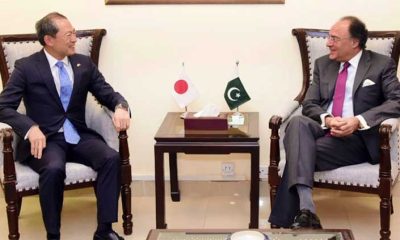
 Business3 months ago
Business3 months agoFinance Minister Aurangzeb discusses bilateral cooperation with Japanese envoy
-

 pakistan3 months ago
pakistan3 months agoSC additional registrar submits response to show-cause notice in contempt case
-

 Entertainment3 months ago
Entertainment3 months agoWhat Khalil-ur-Rehman Qamar feels about Mahira Khan
-

 Sports3 months ago
Sports3 months agoSwiatek powers into Raducanu clash as Fritz fires Melbourne warning
-
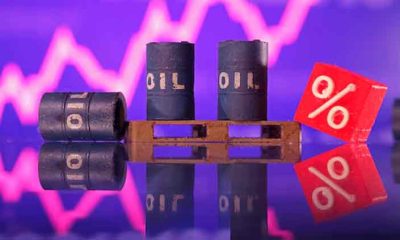
 Business3 months ago
Business3 months agoOil jumps on expectations new US sanctions to cut Russian supply
-

 Tech3 months ago
Tech3 months agoMicrosoft’s LinkedIn sued for disclosing customer information to train AI models
-
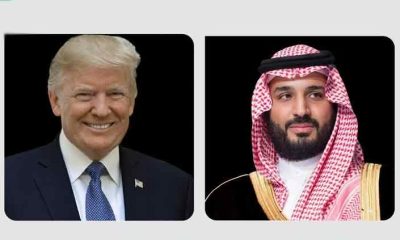
 World3 months ago
World3 months agoSaudi Arabia plans 600bn dollars in new US investment, trade over four years
-
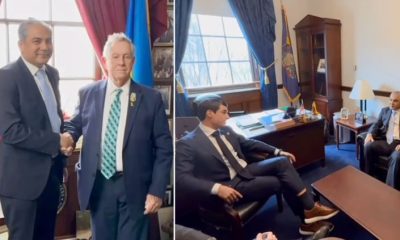
 pakistan3 months ago
pakistan3 months agoMohsin Naqvi sees new chapter in Pak-US relations under Trump











